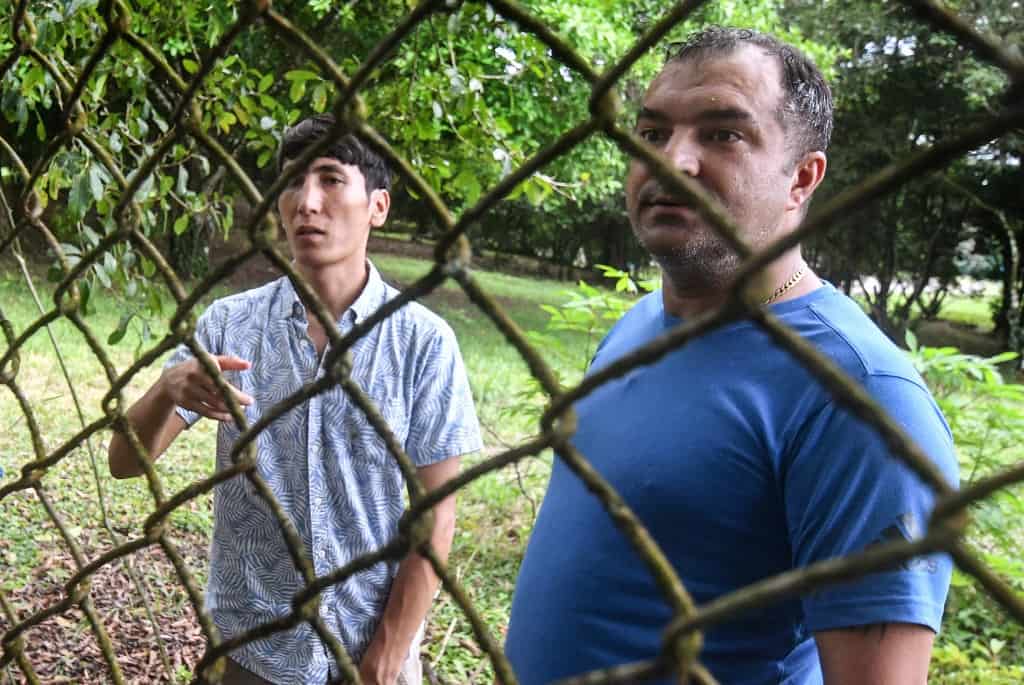Marwa fled Afghanistan because she wanted to study, work, wear jeans, and go to the park without mandatory male accompaniment. Now, locked in a shelter in Costa Rica with a hundred others deported by the United States, she fears being sent back: “The Taliban will kill me.” Behind the bars of the Temporary Migrant Care Center (Catem), near the border with Panama, this 27-year-old Afghan woman says, off camera and under a fictitious name, that her husband is also in danger and that her two-year-old daughter has no future in Afghanistan.
“If I go back, I will die. The Taliban will kill me. I lost my father and my uncle there. I heard explosions and saw dead people. I don’t want to lose my husband or my baby,” she confides that, among bushes at a point without police surveillance, spoke with several deportees in English. Marwa, her husband Mohammad Asadi and their daughter are among 200 migrants – about 80 of them children – from Afghanistan, Iran, Russia, and other Asian and some African countries that the United States sent a month ago on two flights to Costa Rica.
Donald Trump’s government closed legal entry routes to the United States, suspended refugee plans, and began a hunt for migrants to deport them. In addition to Costa Rica, it sent 300 Asians to Panama and 238 Venezuelans to El Salvador, who were held in a maximum-security prison, claiming, without evidence, that they were members of the criminal gang Tren de Aragua.
Tropical Limbo
Of those who arrived with Marwa, 74 were repatriated, 10 will soon return, and more than a hundred wait in limbo: they refuse to return to their country, but no other, including Costa Rica with its long tradition of refuge, has given them asylum. “We cannot go back and we cannot stay here either. We do not know the culture or speak Spanish. We do not have family members like in Canada, the United States, or Europe,” says Marwa, who wears a light-woven hijab due to the humid heat of the tropics.
Her husband Asadi, 31, selling construction materials to US companies put him in the crosshairs when the Taliban returned to power in 2021. Both left for Iran, where everything was also difficult. Two and a half years later, they traveled to Brazil and undertook the journey by land through a dozen countries – including Panama’s dangerous Darien jungle – until reaching the United States.
“There are many cartels along the way that took our money and tortured us physically and mentally,” says Alireza Salimivir, a 35-year-old Iranian who made a similar odyssey with his wife. She remained detained in the United States in deportation proceedings, but Salimivir hopes to reunite with her soon. For both, repatriation is not an option either: “For our conversion from Islam to Christianity, they will give us prison or death.”
Deported with his wife and six-year-old child, German Smirnov, 36, believes that in Vladimir Putin’s Russia he would be “tortured” for reporting anomalies he claims to have seen as an observer in the 2024 elections. “They will give me a choice: go to prison or to war,” he says.
“Accomplice” of the US
When they were detained for deportation, Asadi recalls, US officials offended Marwa for wearing a hijab. “They treated women and children like scum,” adds Smirnov. At Catem, 350 km south of San José, they have good food and mobile phones, but their passports are held by the police, and they are not allowed to leave, despite having no criminal records.
“There is a systematic pattern of human rights violations in a country that has always prided itself on defending them. It is a very serious setback for Costa Rica,” said former diplomat Mauricio Herrera, who filed a habeas corpus on behalf of the deportees. In justifying the agreement with Washington, President Rodrigo Chaves said he was “helping the powerful brother from the north.”
“Costa Rica should not be complicit in the flagrant abuses of the United States,” warned Michael Garcia Bochenek of Human Rights Watch. According to several deportees, authorities told them on Wednesday that if they obtained refugee status, they would have to leave the shelter. This is what Panama did with dozens who, after confining them to a center in Darién, set them free, abandoned to their fate.
Marwa doesn’t know what will happen, but she is sure she does not want to wear a burqa or stay at home cooking and raising babies. Much less does she want this future for her daughter. “Everything is closed for women… schools, universities. It’s not normal. I am a human being, I choose and I want to be like this,” she says showing her jeans shortly before moving away from the fence to return with Asadi, hand in hand, to the confinement of Catem.






